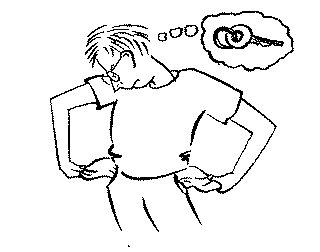Unit 7. Present Perfect (1) (I have done)
(настоящее совершенное время 1)
Study this example situation:
 |
Tom is looking for his key. He can't find it.
He has lost his key. "He has lost his key" = He lost it and he still hasn't got it. Have/ has lost is the Present Perfect Simple:
|
The Present Perfect Simple is have/ has + past participle. The past participle often ends in -ed (finished/ decided etc.), but many important verbs are irregular (lost/ done/ been/ written etc.). For a list of irregular verbs, see Appendix 1. Regular and irregular verbs (правильные и неправильные глаголы).
When we use the Present Perfect there is always a connection with now. The action in the past has a result now:
- "Where's your key?" "I don't know. I've lost it." (I haven't got it now)
- He told me his name but I've forgotten it. (I can't remember it now)
- "Is Sally here?" "No, she's gone out." (she is out now)
- I can't find my bag. Have you seen it? (do you know where it is now?)
We often use the Present Perfect to give new information or to announce a recent happening:
- Ow! I've cut my finger.
- The road is closed. There's been ( = there has been) an accident.
- (from the news) The police have arrested two men in connection with the robbery.
|
Note the difference between gone (to) and been (to):
- Jim is away on holiday. He has gone to Spain. ( = he is there now or on his way there)
- Jane is back home from holiday now. She has been to Italy. ( = she has now come back from Italy)
For been (to) see also Unit 8. Present Perfect (2) (I have done) (настоящее совершенное время 2) and Unit 125. To/at/in/into (использование данных оборотов).
See Unit 8. Present Perfect (2) (I have done) (настоящее совершенное время 2).
See Unit 11. How long have you (been)…? (настоящее совершенное время).
See Unit 9. Present Perfect Continuous (I have been doing) (настоящее совершенное продолженное время).
See Unit 10. Present Perfect Continuous and Simple (I have been doing and I have done) (настоящее совершенное продолженное и настоящее совершенное времена).
See Unit 12. When…? and How long…? For and since (сравнение Past Simple и Present Perfect).
See Unit 13. Present Perfect and Past (1) (I have done and I did) (настоящее совершенное и простое прошедшее времена 1).
See Unit 14. Present Perfect and Past (2) (I have done and I did) (настоящее совершенное и простое прошедшее времена 2).
See Appendix 7. American English (американский диалект).
хостинг для сайтов © Langust Agency 1999-2024, ссылка на сайт обязательна![агентство Лангуст [переход на главную] Агентство Лангуст [переход на главную]](/pic/logo.gif)

